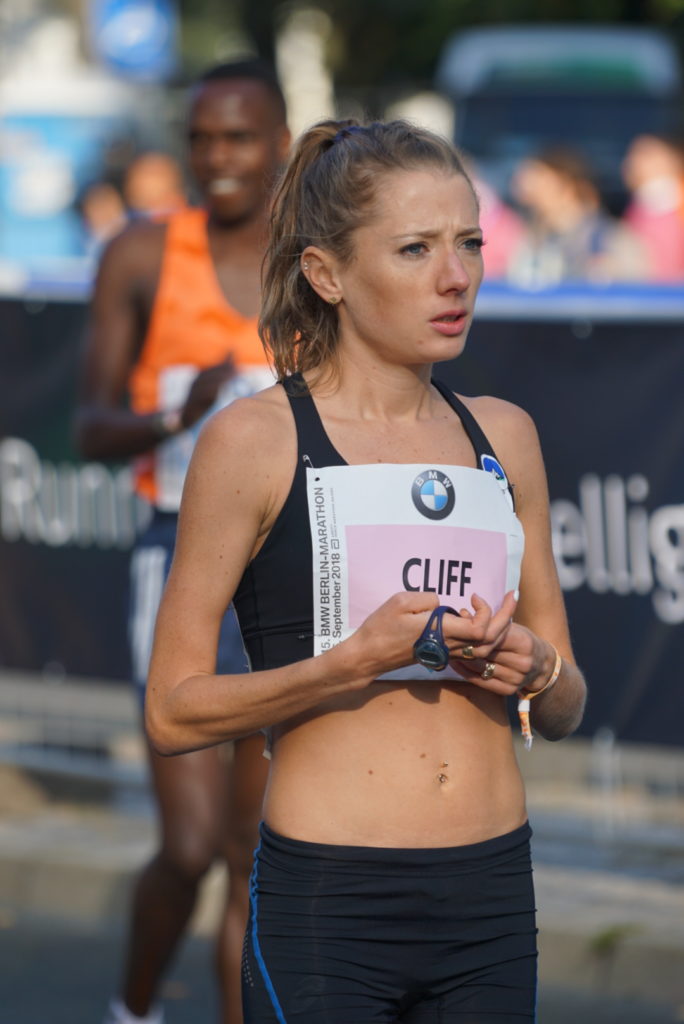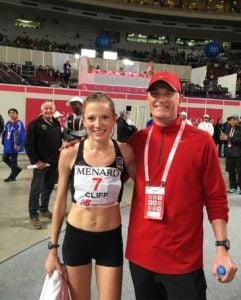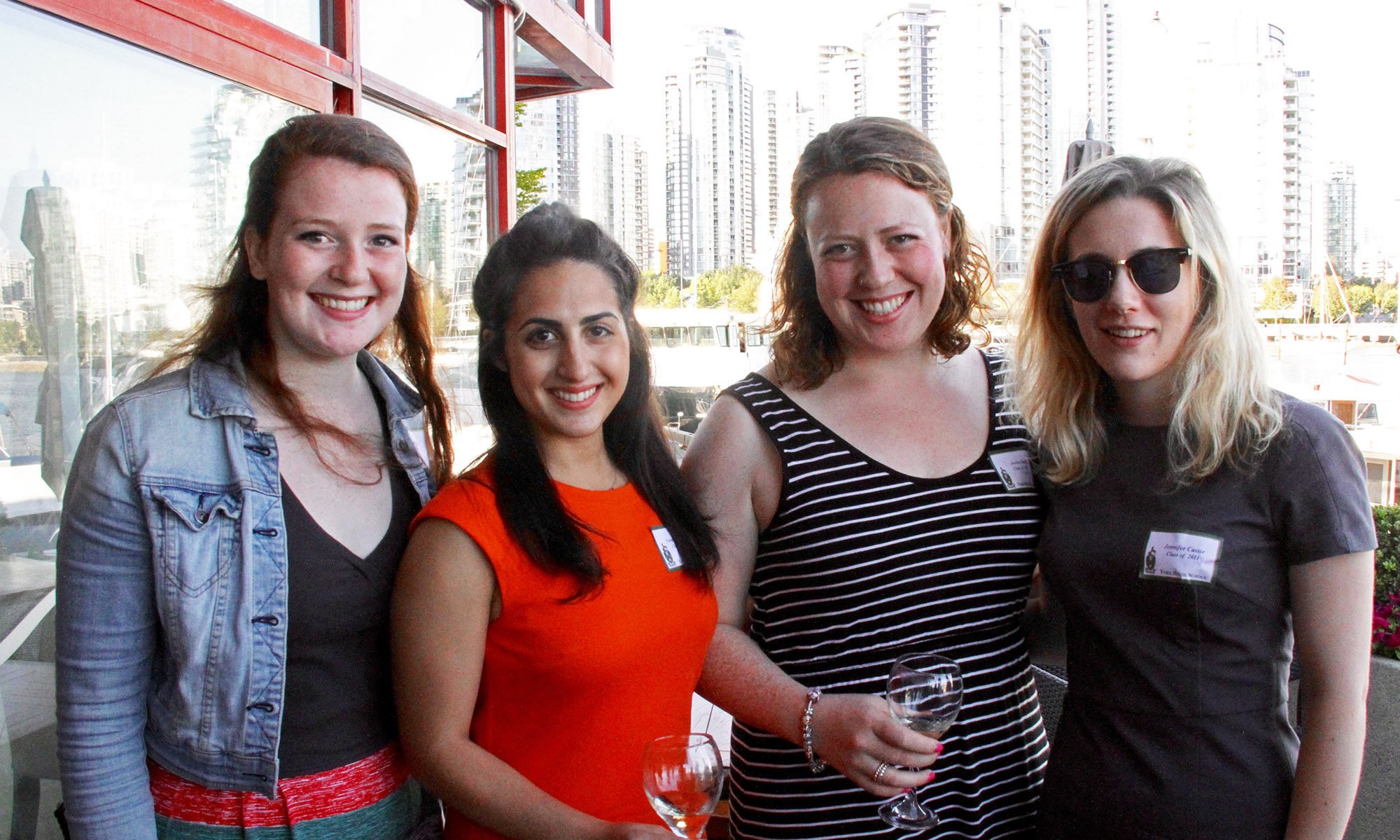Rachel Cliff is more known for track and field running but recently, she hit a new Canadian record in marathon running. We caught up with her after her trip to Japan.

- Last September you made your marathon debut at the Berlin Marathon, what was that like?
Historically I’ve had more of a track and field background – mostly specializing in the 5,000m to the 10,000m – my focus only started to shift to road races over the past few years, especially in early 2018. By the time I stood on the line for my first marathon I’d raced six half marathons in the span of a year and a half and this helped to make the transition to the marathon a little less of a shock, but it was still a huge learning experience. The workouts were longer and more rhythm based than what I was used to, the fatigue was significant, and I had to learn how to fuel during workouts and racing. I also ran the Berlin marathon after a long track season which was a little risky; I was at the end of my rope fatigue wise and we had to manage that really carefully. But despite all this, the training went well and I felt fortunate to still feel like a “student of the sport” despite being a veteran athlete. The Berlin marathon itself was amazing – it’s a huge world class marathon, the course is beautiful and fast – I don’t think there’s a single hill in Berlin – and the atmosphere was fun. I also ran on the same day that Kipchoge ran the World Record in the marathon and was sitting close to him hours before the race started in the meet hotel (see attached picture). That was a once-in-a-lifetime experience! It’s not my fastest marathon ever but it was a really positive debut.
- Setting a new Canadian record is an incredible achievement! Take us through your experience in Japan.
It’s important to note that a lot of work went into getting me to the start line fit, healthy, and ready to compete – not just from me but from a lot people who helped along the way – my coach, physio, strength trainer, sports psychologist, exercise physiologists, support crew (family, friends, husband) and teammates (and I’m sure I’m missing someone in there!!). In hindsight the training going into Nagoya went well, but while I was going through it I was more focused on the process and less on the result so in that sense I surprised myself on race day.
 The race was held on a Sunday morning in Nagoya, Japan and I flew there alone on the Tuesday before, arriving the Wednesday night. My coach joined me a day later. Traveling to international races as an invited athlete can be stressful, especially in Japan where the food is a little different form what you’re used to at home. But there was several other athletes from Australia, New Zealand and Ireland, and my coach actually lived in Japan for a few years in the 80’s so we were able to navigate it without problems. The Nagoya marathon is a women’s only race – the largest of its kind in the world – and that was a seriously cool thing to experience. Typically marathons are mixed gender. Because it’s not hard to find a man who can run a sub 2:30 marathon elite females can normally draft off of and work with the men in the race. It’s not uncommon, or in any way unethical, for a woman to have a male pace her through 30k of a marathon, but in Nagoya this was not an option. Every athlete I ran with was a female, the pace-setters who took us through 30k were female, the 14 athletes who beat me were all running 2:26 or faster, which is a solid, world class time for a female. Thousands of fans lined the streets to cheer us girls on. It was a very empowering thing to experience.
The race was held on a Sunday morning in Nagoya, Japan and I flew there alone on the Tuesday before, arriving the Wednesday night. My coach joined me a day later. Traveling to international races as an invited athlete can be stressful, especially in Japan where the food is a little different form what you’re used to at home. But there was several other athletes from Australia, New Zealand and Ireland, and my coach actually lived in Japan for a few years in the 80’s so we were able to navigate it without problems. The Nagoya marathon is a women’s only race – the largest of its kind in the world – and that was a seriously cool thing to experience. Typically marathons are mixed gender. Because it’s not hard to find a man who can run a sub 2:30 marathon elite females can normally draft off of and work with the men in the race. It’s not uncommon, or in any way unethical, for a woman to have a male pace her through 30k of a marathon, but in Nagoya this was not an option. Every athlete I ran with was a female, the pace-setters who took us through 30k were female, the 14 athletes who beat me were all running 2:26 or faster, which is a solid, world class time for a female. Thousands of fans lined the streets to cheer us girls on. It was a very empowering thing to experience.
I think deep down everyone involved in my training knew I was capable of the result – A Canadian record and a 2:26:56 marathon – but actually pulling it off was something else. After the race it was really nice having my coach there to celebrate with. We had about 24 hours to eat sushi and enjoy some Japanese beer before heading back to Canada.
3. You also finished ninth in the 10,000 metres in the Commonwealth Games last April. What’s your preference?
The marathon and the 10,000m are two very different events and I love them both in their own way. Commonwealth Games didn’t play out as I would have liked but I’ve definitely had 10,000m races on the track which came together and it’s a really fun distance to race. The marathon is largely about the training and details that go into planning for the event, and then on race day you execute your plan and hope that things beyond your control (weather, pace setters, general health etc.) hold together. Of course fitness matters in the 10,000m but it’s more of a pure race – you need to respond to your competitors and make tactical moves intelligently. Running 25 laps of the track (10,000m) and 42.2km on the road are probably pretty comparable when it comes to the mental and physical demands during the race, but the type of pain you experience and focus it requires are completely different. The marathon also takes a lot longer to recover from which is good and bad – it means you can’t do back to back races but you also get to take time to celebrate your achievement after which is something you have less of in the 10,000m. I’m hoping to return to racing on the track this summer and I’m curious to see how I find it after focusing on the marathon for the better part of this past year.
- Describe your training regime prior to any major running event?
With the exception of two two-week blocks of rest each year I basically train year round, regardless of the event. The details of what workout and how much volume of running I do each week depends a bit on the event I’m training for – the training program will have more speed for shorter races and marathon training involves a lot more tempo runs and high volume. In general, I run 7-10 times a week, do 2-3 event specific workouts, lift weights and pool run twice a week and do physio drills daily. My total volume varies between 65-90 miles a week depending on if I’m training for a marathon or in the middle of a competitive track season. It’s taken me years to build up to this type of training volume and now it comes fairly easily, but in order to handle it I need to dedicate a lot of time to rest and recovery between sessions.
- Give us an insight into your daily eating habits.
I can’t emphasize this enough – training for endurance sport is associated with huge caloric, and micro- and macro-nutrient demands. I work hard on my nutrition and try need to eat healthy, nutrient dense, well balanced meals. It’s important to avoid counting calories, or cutting out entire food groups as in the long run this is not sustainable or healthy. Training for the marathon also requires fueling with carbohydrates during training as you deplete your muscle-glycogen storages in longer workouts, which has been interesting to learn about. Nutrition is very important in sport, and it can be expensive and time consuming to keep up with. In big training blocks I’ve found that cookies are often the most efficient way to get your calories in quick!
- Last but not least, as a Yorkie, do you have any particular school memory that ignited your passion for running?
I first joined Cross Country as a Yorkie in grade 4 and, with the exception of grade 9 where I didn’t run track, was on the team every single year from then on! The gym teachers and XC/track and field coaches were all really supportive of my love for running even back then, and are probably a large part of why I’m in the sport now. I have a lot of fond memories from my days of competing as a Tiger, but specifically remember every year Mr. Jackson would design new, special technical shirts for the cross country team so we could be the “sharpest looking team” at zones. I’d look forward to seeing what he’d planned every year! In my grade 12 year our cross country team placed 3rd in the province which also stands out.

